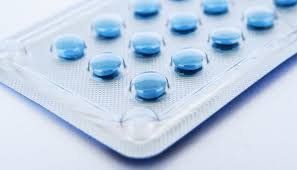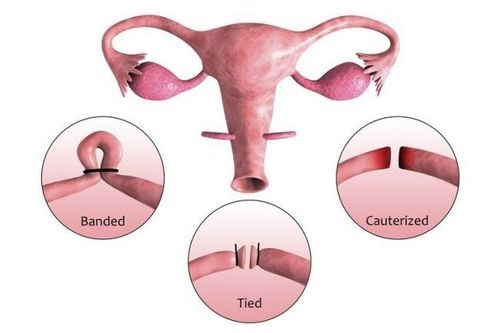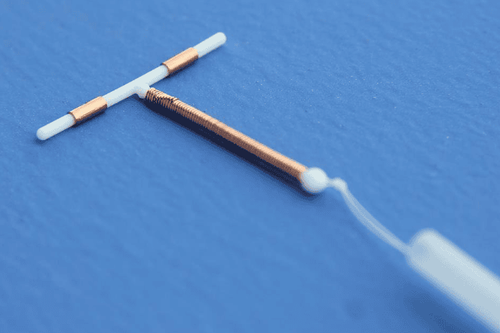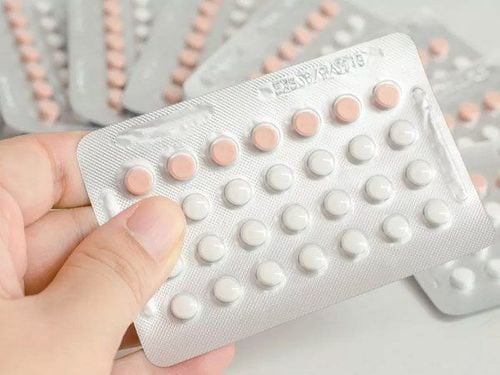This is an automatically translated article.
The article was expertly consulted by MSc Nguyen Thi Hong On, Department of Obstetrics and Gynecology - Vinmec Phu Quoc International General Hospital.The emergency contraceptive pill can prevent pregnancy after unprotected sex or in cases where contraception has failed such as a condom that slips, breaks, or forgets to take the pill. Daily... Using oral contraceptives should be consulted by a doctor to avoid side effects affecting a woman's fertility.
1. What is the emergency contraceptive pill?
The emergency contraceptive pill is a type of birth control that can be used by women who have had unprotected sex or whose birth control method has failed. Therapy is usually reserved for specific situations and is not a common method of birth control. Urgent uses include being raped, having a condom torn or slipped during sex, or missing two or more daily pills during a one-month cycle.Oral emergency contraception can be used to prevent pregnancy. They work mainly by delaying ovulation. Emergency contraception does not protect against sexually transmitted diseases. The emergency contraceptive pill is not a medicine used for miscarriage.
There are 3 types of emergency contraception available in drug stores and over the counter. As long as people using drugs over 17 years old can buy them or can use the prescription of a specialist doctor. Depending on the brand and dosage of the pill, you can take 1 or 2 pills for emergency contraception.
Recommended video:
How does the emergency contraceptive pill work?
Emergency contraceptive pills are pills that contain a hormone called levonorgestrel. This is a specially packaged emergency contraceptive pill. It is readily available in pharmacies and can be used by anyone without a prescription.
Another type of emergency contraception is called ulipristal (ella, ellaOne). This is a non-hormonal emergency contraceptive pill. It contains ulipristal which blocks key hormones that play a role in conception. However, this is a drug that is only used under the prescription of a specialist.
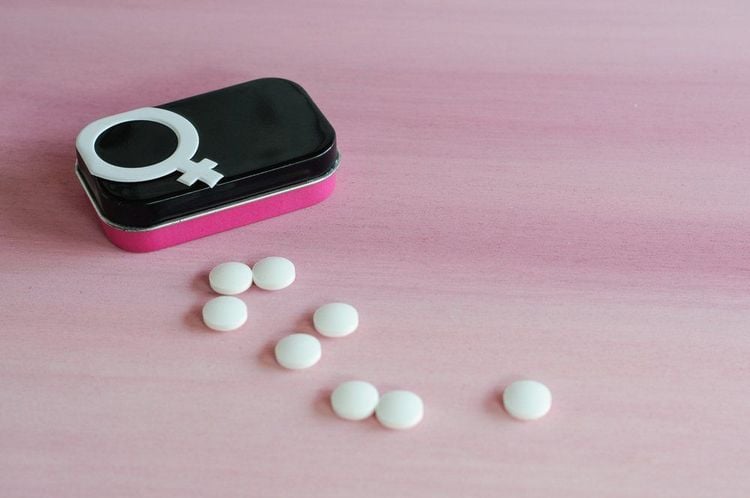
Thuốc tránh thai khẩn cấp không nên lạm dụng
2. How does emergency contraception work?
Emergency contraception - Levonorgestrel prevents pregnancy by stopping an ovum from being released, possibly stopping fertilization, or keeping a fertilized egg from implanting in the uterus. Emergency contraceptive pills are taken in one dose with one pill. Its effectiveness depends on how early or late it is taken after unprotected sex. Therefore, the pill should be taken as soon as possible and preferably within 72 hours of unprotected sex. When used as directed, it can reduce the chance of pregnancy by as much as 90%.Emergency contraception - Ella can be effective up to 120 hours after unprotected sex. The drug is also taken as one tablet in one dose.
Trắc nghiệm: Dấu hiệu cảnh báo chuyển dạ thực sự
Chuyển dạ là quá trình thai phụ bước vào giai đoạn “đẻ đau” để kết thúc thời gian “mang nặng”. Thời gian và dấu hiệu chuyển dạ sẽ khác nhau tùy vào vào từng người và nhiều yếu tố. Theo dõi bài trắc nghiệm dưới đây sẽ giúp bạn hiểu rõ hơn các dấu hiệu chuyển dạ một cách chính xác và an toàn.3. Situations where emergency contraception can be used
Emergency contraception can be used in a number of situations after sex including:When no contraception is used at all Women are sexually assaulted without protection with a method What is an effective method of contraception? When you are concerned that your birth control method is not effective, such as: The condom has slipped or broken. Three or more consecutive missed oral contraceptive pills 3 hours later than the time to take the progesterone-only pill (minipill) or 27 hours later than the next pill 12 hours later than time to take the regular desogestrel-containing pill (0.75mg) or 36 hours later than the next pill 2 weeks later for the pro-estrogen norethisterone enanthate injection (NET_EN) 4 weeks later for the pro-estrogen injectable norethisterone enanthate (NET_EN) pro-estrogen-de-pro- medroxyprogesterone acetate (DMPA) More than 7 days late for injectable contraception Failed Vaginal Ejaculation Failed use of spermicide or the drug melts before intercourse Miscalculation of abstinence time, or no abstinence

Quan hệ không dùng biện pháp tránh thai
4. Side effects of emergency contraceptive pills
Birth control pills do not cause serious side effects. But if used incorrectly, it can cause side effects such as:Nausea or vomiting Headache Abdominal pain Fatigue Fatigue Chest tightness Changes in menstrual cycle. It may be earlier, later, or more painful than usual when your period comes. If some symptoms do not go away after a few days, it is necessary to see a doctor for advice and examination. Signs could be:
May still be pregnant Next period is more than 7 days late Sudden lower abdominal pain - in extremely rare cases, a fertilized egg may implant outside the uterus uterus (ectopic pregnancy)

Tác dụng phụ của thuốc tránh thai khẩn cấp cs thể gây buồn nôn hoặc nôn
5. Efficacy of emergency contraceptive pills
The effectiveness of the emergency contraceptive pill is demonstrated by the reduction in pregnancy rates during a single use of the pill. For example, drug use is 75% effective, and this effect can be calculated like this: “A 75% figure doesn't translate into a 25% pregnancy rate. Instead, it means that if 100 women had unprotected intercourse in the two weeks between their menstrual cycle, about 80 women would get pregnant. Using emergency contraception will reduce that number by 75% to 20 women.”Progestin-only regimens (using levonorgestrel) are 89% effective. This figure is explained by the US organization that explains the effectiveness of this emergency contraceptive pill as seven in eight women will not get pregnant when using the pill.
For 10mg mifepristone taken up to 120 hours (5 days) after intercourse was 83% effective. Research scientists show that a moderate dose of mifepristone is better at delaying menstruation - this is the main side effect of most emergency contraceptive pills.

Thuốc tránh thai mifepristone
6. The safety of using emergency contraception
The side effects of the emergency contraceptive pill are similar to those of the daily oral contraceptive pill. In the event that vomiting occurs within 2 hours of taking a dose, the dose should be repeated again. In addition, regular antiemetics should not be used before using emergency contraception.The emergency contraceptive pill is not the perfect way to prevent pregnancy during unsafe intercourse. Using emergency contraceptive pills for a period of time can have serious consequences and reduce the ability to prevent pregnancy. In addition, in some people taking emergency contraceptive pills a lot or using a very short time between two times, such as taking birth control pills twice a week, can cause infertility risks for women. . Therefore, the misuse of emergency contraceptive pills will cause developmental and ovulation restrictions. In addition to causing side effects, emergency contraceptive pills can cause high-risk conditions that affect fertility such as atrophy of the lining of the uterus, a thin lining of the uterus that makes it impossible for an egg to work. Therefore, if it is necessary to use emergency contraceptive pills, you should read the instructions carefully before using them, and at the same time, you should consult a specialist doctor to avoid possible risks. .

Tác dụng phụ của thuốc tránh thai khẩn cấp cũng tương tự như thuốc tránh thai hàng ngày
Doctor Nguyen Thi Hong On has strengths in emergency obstetrics and gynecology; treatment and surgery of obstetric pathologies and prenatal diagnosis and consultation, amniocentesis.
Recommended video:
Taking care of pregnant women's health: A handbook for pregnant women to know
Please dial HOTLINE for more information or register for an appointment HERE. Download MyVinmec app to make appointments faster and to manage your bookings easily.
References: nhs.uk, who.int, webmd.com,




